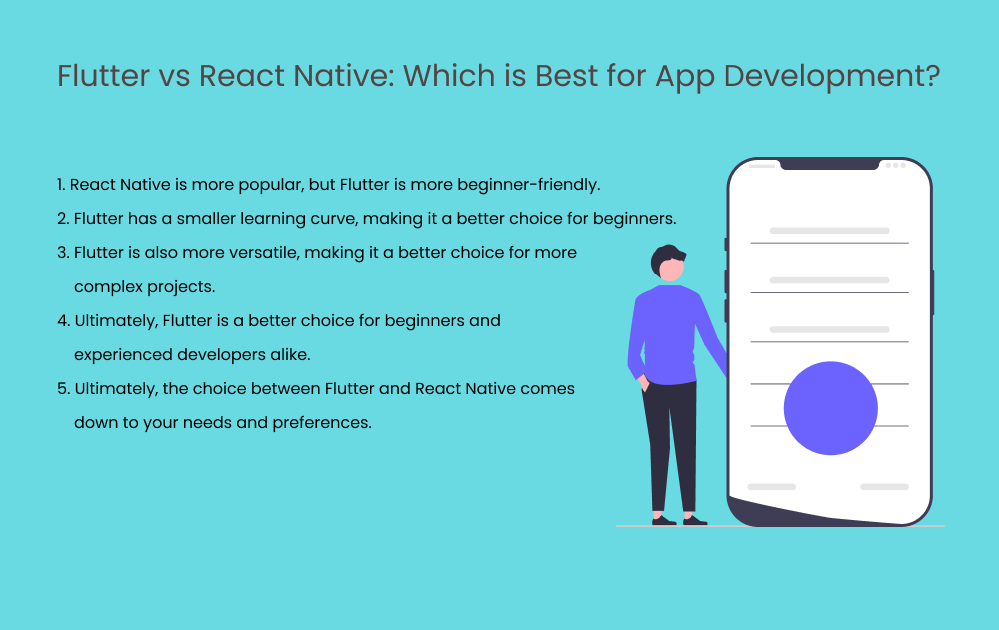Flutter vs React Native: Which is More Useful for Development?
Flutter and React Native are two popular frameworks for mobile development. While they share some similarities, they also have some key differences. So which one is more useful for development? In this blog post, we’ll take a look at the pros and cons of each framework and help you decide which one is right for you. React Native vs Flutter which is best for you to check out.
Ionic
The Ionic framework is a popular choice for mobile development. It’s based on AngularJS, which means that it has a lot of features and functionality that you can use in your app. Ionic also comes with a number of built-in components that you can use, which can save you a lot of time and effort when you’re starting a new project.
One downside of Ionic is that it can be a bit more complex to use than some of the other frameworks. Additionally, it can be more challenging to create complex animations and interactions using Ionic.
Pros:
Ionic is based on AngularJS, which offers a lot of features and functionality.
Ionic comes with a number of built-in components that you can use in your app.
Cons:
Ionic can be more complex to use than some of the other frameworks.It can be more challenging to create complex animations and interactions using Ionic.
Flutter is more beginner-friendly than React Native.
Flutter and React Native are both popular mobile development frameworks. However, React Native is more popular than Flutter. Here’s why:
- React Native has been around for longer. It was first released in 2015, while Flutter was released in 2017.
- React Native is more popular with developers. According to a survey by Stack Overflow, React Native is the most popular mobile development framework among developers.
- React Native is used by more big companies. Some of the companies using React Native include Facebook, Instagram, Tesla, and Airbnb.
- React Native has better performance than Flutter. This is because React Native uses native components, while Flutter uses its own widgets.
- React Native is more flexible than Flutter. This is because React Native allows you to use JavaScript and other programming languages, while Flutter only allows you to use Dart.
- React Native has a better selection of components. This is because React Native has more than 5,000 components, while Flutter only has a few hundred.
- React Native is more stable than Flutter. This is because React Native is backed by Facebook, while Flutter is backed by Google.
- React Native is better suited for complex applications. This is because React Native uses a declarative programming paradigm, while Flutter uses an imperative programming paradigm.
- React Native is more popular than Flutter. This is because React Native is more popular with developers and big companies.
Flutter has more features than React Native.
If you’re looking to get started with mobile app development, you may be wondering whether to choose Flutter or React Native. While both frameworks have their own pros and cons, we think Flutter is a great choice for beginners. Here’s why:
Flutter is more beginner-friendly than React Native. First of all, Flutter uses Dart, a language that is much easier to learn than JavaScript (the language used for React Native). Dart is also a typed language, which means that it’s easier to catch errors early on.
Another advantage of Flutter is that it uses a declarative style of programming, which is generally easier to learn and reason about than an imperative style (like React Native). Declarative programming is also often more concise, which can save you time and frustration when writing code.
Finally, Flutter comes with a great set of tools and documentation that make it easy to get started and continue learning. For example, the Dart programming language has an excellent online tutorial that can get you up and running quickly.
React Native is a great choice for mobile app development, but we think Flutter is a better choice for beginners. If you’re just starting out, you’ll find it easier to learn and use Flutter.
In the world of mobile app development, there are two major platforms that developers target: iOS and Android. And while there are many ways to develop apps for these platforms, two of the most popular frameworks are Flutter and React Native.
So, which one is better? Flutter or React Native?
Well, it depends. Each has its own advantages and disadvantages. But if we had to choose one, we would say that Flutter is the better option, for several reasons.
First, Flutter has more features than React Native. It supports a wider range of app development features, including animation and 2D and 3D graphics.
Second, Flutter is faster and smoother than React Native. This is because it uses a different rendering engine than React Native.
And third, Flutter is more flexible than React Native. This means that it is easier to change the look and feel of your app, without having to rewrite the code.
So, if you’re looking for a mobile app development framework that has more features, is faster and smoother, and is more flexible, then Flutter is the better option.
tagline infotech

